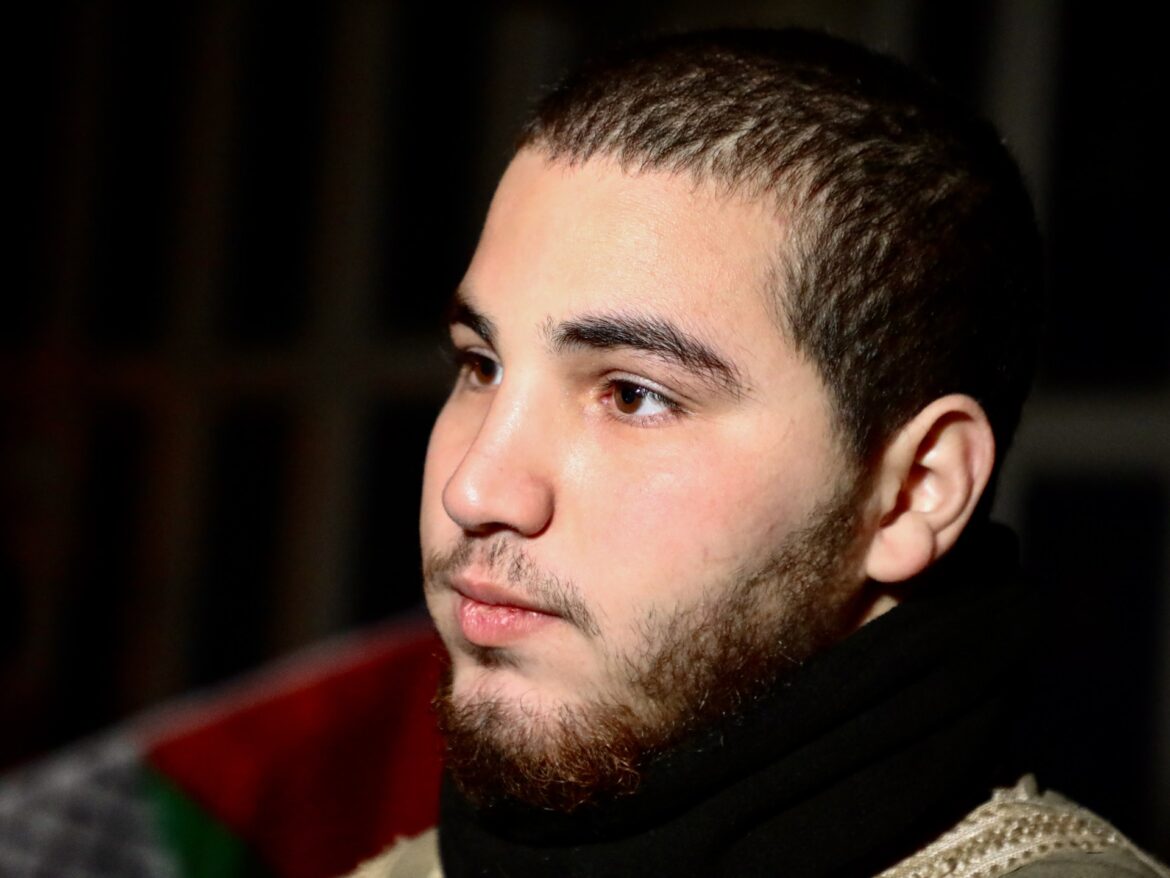Hebron, occupied West Bank – After eight months in Israeli prisons without being charged or tried, 18-year-old Mohammad Salhab Tamimi was finally able to return to his family as part of an ongoing prisoner exchange deal.
His childish face was serious as he kissed his parents and stood up, slightly disconcerted, as if unsure whether or not to speak to the press.
He has gone through a lot of uncertainty over the past eight months, turmoil that has only gotten worse since the Al-Aqsa flooding operation began on October 7.
The last thing Israeli prison guards told him was that he would be arrested again and returned to the limbo of administrative detention if his family and friends showed any sign of celebrating his return.
“’Talk to your friends (they said)’…If we have a big party, I’ll go back to jail,” he recalled.
Wary of the Israeli military checkpoint and illegal settlement next to their home, his family kept their happiness muted, attended only by immediate family and a few uncles.
Chained, beaten, humiliated
Luckily for the family, the smiles don’t make a sound, and no one could stop the smiles on the faces of his mother Fatima and father Murshid as they held their “little boy” tightly.
Their boy was among the fourth group of Palestinian prisoners released from Ofer prison, near Ramallah, in the early hours of Tuesday night. Until the last minute, he wasn’t sure what was happening to him.
At 7 a.m. (0500 GMT) on Monday, November 27, a guard at Rimon Prison demanded that Mohammad prepare to be transferred to Ofer Prison. That was all; nothing about why it was moved. He was just told to strip completely naked, put on just a gray prison tracksuit and gather all his things.
“I put my clothes in one of those plastic envelopes and walked to the cell door where they handcuffed my hands and forced me to lower my head so that I looked at the ground .
“The policeman then kicked me violently. His boots were made of steel, so it felt like he was crushing my feet, it really hurt.
“He dragged me to the prison yard but as he was dragging me out of the prison he stopped to take my clothes and threw them in a trash can. Then, insulting me with obscene language, he dragged me out,” Mohammad recalls hesitantly.
Mohammad was loaded into a prisoner transfer vehicle known as a “bosta” – a van with blackened windows and narrow cells with metal seats, to which prisoners are chained.
Bosta trips can last 12 hours or more. There are no rest areas, food or bathroom breaks. “I was kept in the vehicle cell without eating or drinking until after midnight,” Mohammad said.

His father and uncle were waiting for him outside Ofer when he was finally released in the early hours of Tuesday so they could drive him home to Hebron, in the southern occupied West Bank.
A decision to humiliate
Things were more unpleasant than usual in prison after October 7, when Hamas launched a surprise attack from Gaza on southern Israel, killing some 1,200 people.
Those detained in several facilities reported being severely beaten, denied medical care, visits from lawyers and their families, spending time in the courtyard, access to electricity, water and essential hygiene products from the prison store.
At least six Palestinian prisoners have died or been killed while in Israeli custody since October 7, some shortly after their arrest.
Israel’s relentless bombardment of the Gaza Strip after the Hamas attack lasted 48 days and killed more than 15,000 Palestinians, including more than 6,000 children.
On Friday, the 49th day, a four-day “humanitarian pause” negotiated by Egypt and Qatar began. Both sides said they would release the captives – Hamas would release batches of people it had captured on October 7 in exchange for three times as many Palestinians detained – with and without cause – in Israeli detention centers.
As the exchanges continued and optimism grew, the truce was extended by two days to continue the exchanges.

In the same days that it released some 150 Palestinian detainees, Israel arrested 133 people, almost as many, in the occupied West Bank and East Jerusalem, according to Palestinian prisoners’ associations. Since October 7, Israel has made 3,290 arrests in the same areas it has occupied since 1967.
Mohammad is not the first released person to say that there is extreme overcrowding in Israeli prisons.
“There were 10 prisoners locked in cells that only had six beds. Before, we had to spread blankets or something on the floor to sleep,” he said.
The amount of food given to them was insufficient, as it was also intended for six prisoners, not ten. Inmates had to carefully ration the food they received.
Several prisoners were also injured one day, Mohammad said, when prison guards attacked two sections of Rimon prison.
In addition to the reported injuries and deaths, Mohammad said: “The (Israeli) occupation had practically decided to humiliate the prisoners since the outbreak of the Al-Aqsa storm. »
Cut off from all news of the outside world, the inmates found themselves stripped of almost everything, including all the possessions in their cells such as utensils and appliances that allowed them to make things a little more pleasant. They were unable to buy hygiene products, including laundry detergent, and were not allowed to use washing machines to wash their clothes.
Prison authorities also kept prisoners away from their only means of letting off steam – the “forums”, or prison courtyard, and prevented them from making noise.
“I loved to raise the call to prayer from my cell so the whole section could hear, but that too was forbidden.
“It was like they didn’t even want us to breathe.”



